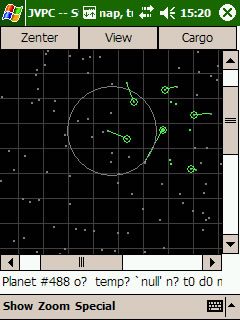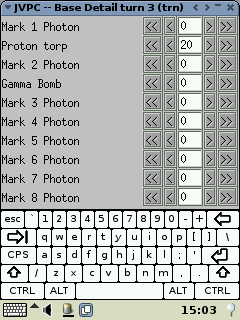| JVPC home | GPL/LGPL | Download/Install | Java VMs | JVPC/VPCheck | People | Kero's VGAP-page | Project Page |
The JVPC Home-Page |
|
Newsflash (10 Apr 2005)
Fresh release, works around host.exe bug; PDA PocketPC install guide by Michael Hodgins. |
JVPC is the Java VGA- Planets Client. VGA-Planets is a multi-player, economy, diplomacy, warfare and strategy game for up to 11 players, developed by Tim Wisseman.
JVPC is a portable client, running on virtually every JVM you can lay your hands on. It is small enough to run on decent PDA's without becoming too slow. See supported platforms. All screenshots below are from my iPAQ running linux+kaffe.
Accompanying JVPC is VPCheck, which can perform
various Checks (probable mistakes in your commands) and Actions (automatic
command for various boring tasks).
Also accompanying is blitz-support, as
stand-alone program.
Please Note:
Everything a basic DOSclient requires is implemented (from v0.94 on). Special features include Coverage, teamgame support, small screen support and easy ship-building. Read the (incomplete) Changelog for detailed information. See To Do for upcoming features.
PLANETS.EXE and MAKETURN.EXE can handle data written by JVPC, even when VPUTIL.EXE has second thoughts sometimes) The internal consistency checker prevents a lot of trouble.
I use JVPC in (THost) Tactical Nightmare without trouble. It survives (Phost) blitzes we hold once a few months. That's a very good way to test stability and such. Usually a few small things pop up, but nothing really prevents me from playing.
Due to the split of map and data in different windows, JVPC fits on the screen of a PDA, like my iPAQ (240x320). Throw in a cellphone to dial in (that talks with the PDA over infrared or bluetooth, or grab a smartphone) and you can do your turns on the road! (bring your own email programs, though, JVPC knows nothing about that.)




Startup screen. You can Save, do something with other utilities and
Load again.
| A map is started automatically. This one is zoomed in a bit already,
running on PocketPC 2003.
| The same map. Note the finer grid (10 LY instead of 100 LY). Also, by
clicking the (W)aypoin(t) button, you
can now tick to select an object or drag to select a point in outer space
and finally set the waypoint by clicking (W)aypoin(t) again.
| Here you can see minescan coverage, again of the same map.
| 



All information about a ship.
| All information of a planet, on PocketPC
| Information of ships, and capability to build ships; when required, tech
levels are upgraded (and lowered) automatically; similarly ship-parts are
bought (and sold) when (de)selected.
| Buy torpedoes,
| 



Cargo is a bit skewed (yet readable!) on a small screen :)
| You can read incoming messages...
| ...and write outoing messages, though it's a bit tiny.
| Score doesn't quite fit, right now.
| |
Now we're tackling Java, which has as main advantage built-in graphical support. It is somewhat slower than other languages, but JVM's are improving fast, as well as your average CPU. We set up a class-hierarchy for all data and I started typing. My first excercise was a zoomable starmap, which functioned well. A list of current features.
With JVC gaining momentum, JVPC should cover ground that JVC doesn't. JVPC is much more portable (runs Java 1.1 to 1.4, including Personal Java, compared to java 1.4 only for JVC) and knows more about PHost. That means JVPC is as portable as Java gets and can be ran on PDA's. That is where you should look for focus (usability, mainly), not in all kinds fancy things to copy vpa, jvc, echoview and definitely nothing that's already in RVV.
JVPC is actively maintained! Things to do and bugs to solve.
JVPC is free software, so you can always implement missing features yourself. I'll be more than happy to accept patches with features or bugfixes.
Some first attempt on documenting and describing the features of JVPC and VPCheck are here on-line:
The best way to get more lines in these documentation is to ask me questions (or I might add them to the FAQ :-)| JVPC home | GPL/LGPL | Download/Install | Java VMs | JVPC/VPCheck | People | Kero's VGAP-page | Project Page |